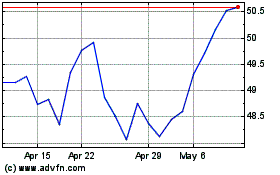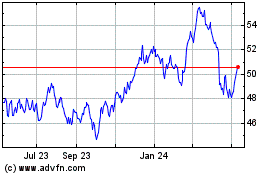Enticed By Low Yields, Companies Sell Debt In Risky Climate
April 10 2012 - 2:07PM
Dow Jones News
Four companies are wading into the U.S. debt markets Tuesday to
take advantage of the drop in corporate bond yields over the last
week, but investors are demanding higher yields to compensate them
in this risky climate.
Zurich Insurance Group Ltd. and U.S. retail chain Kroger Co.
(KR) are leading the new-issue market with benchmark-size deals,
along with smaller deals from Mack-Cali Realty Corp. (CLI) and the
Idaho Power Co.
The four issues follow the lightest week for volume in 2012,
according to Dealogic, and this week is shaping up to be even
softer. No borrowers tried issuing Monday in the wake of the soft
U.S. payrolls report Friday, but the environment was looking stable
Tuesday morning with a flat stock market and only minor weakening
in Markit's CDX North American Investment-Grade Index, a proxy for
risk sentiment.
Stocks have since tumbled and the CDX index had worsened 2.4%,
but companies are attracted by the low Treasury rates that
corporate bonds are based upon. The 10-year Treasury rate has now
dropped at 1.98%, or 0.25 percentage point down from the 2.23% rate
just before the payrolls report.
That's a big motivator. Though corporate bonds haven't kept pace
with the Treasury rally, causing spreads to widen, absolute yields
have dropped in the Barclays investment-grade index. Average yields
finished Monday at 3.37%, compared with 3.47% on April 3, even as
spreads widened 0.08 point in the week.
"All-in yields are the reason these companies are getting in,"
said Vincent Murray at Mizuho Securities. "That's got to be
attractive for anyone who needs to issue debt, but it's a toss-up
because fast-money accounts start to step back when things get
shaky."
A counterweight to falling yields is that investors could start
demanding higher "concessions"--the extra yield on new bonds--to
mitigate potential losses in a riskier environment.
Kroger might be an example of that. Early pricing guidance
suggests it is selling 10-year and 30-year bonds at 1.50 and 1.85
percentage points over Treasury rates. Its outstanding 30-year bond
due 2040 traded Monday at 1.58 points over Treasurys, suggesting
investors are picking up 0.22 point by purchasing the new bond.
But Mack-Cali Realty recently launched its 10-year offering at
2.55 points over Treasurys, a slightly better level than the
2.60-point spread reported earlier, and the deal was enlarged by
$50 million to $300 million.
"Investors are realizing they could get burned on these low
rates, so they want to be compensated for the risk, but at the same
time there isn't enough attractive debt out there to put money to
work, leading to these competing forces," said Jody Lurie,
corporate credit analyst at Janney Capital Markets.
Even before the payrolls report, actively traded new deals were
weakening in the secondary market, according to Scott Kimball,
portfolio manager at Miami-based BMO TCH Corporate Income Fund,
which holds $7.3 billion in assets under management.
"The performance following new issuance is the weakest it has
been in a long time," he said. "The new-issue market is feeling
saturated. If spreads go wider, equity markets remain weak, and
Treasurys rally, we'll have to see bigger concessions to get deals
done."
Since the French media company Vivendi SA (VIVEF, VIV.FR) sold
$800 million of 10-year bonds on April 3 at 2.50 percentage points
over the Treasury rate, spreads have jumped 0.15 point to 2.65
points, according to MarketAxess.
-By Patrick McGee, Dow Jones Newswires; 212-416-2382;
patrick.mcgee@dowjones.com
Zurich Insurance (QX) (USOTC:ZURVY)
Historical Stock Chart
From Jun 2024 to Jul 2024

Zurich Insurance (QX) (USOTC:ZURVY)
Historical Stock Chart
From Jul 2023 to Jul 2024
